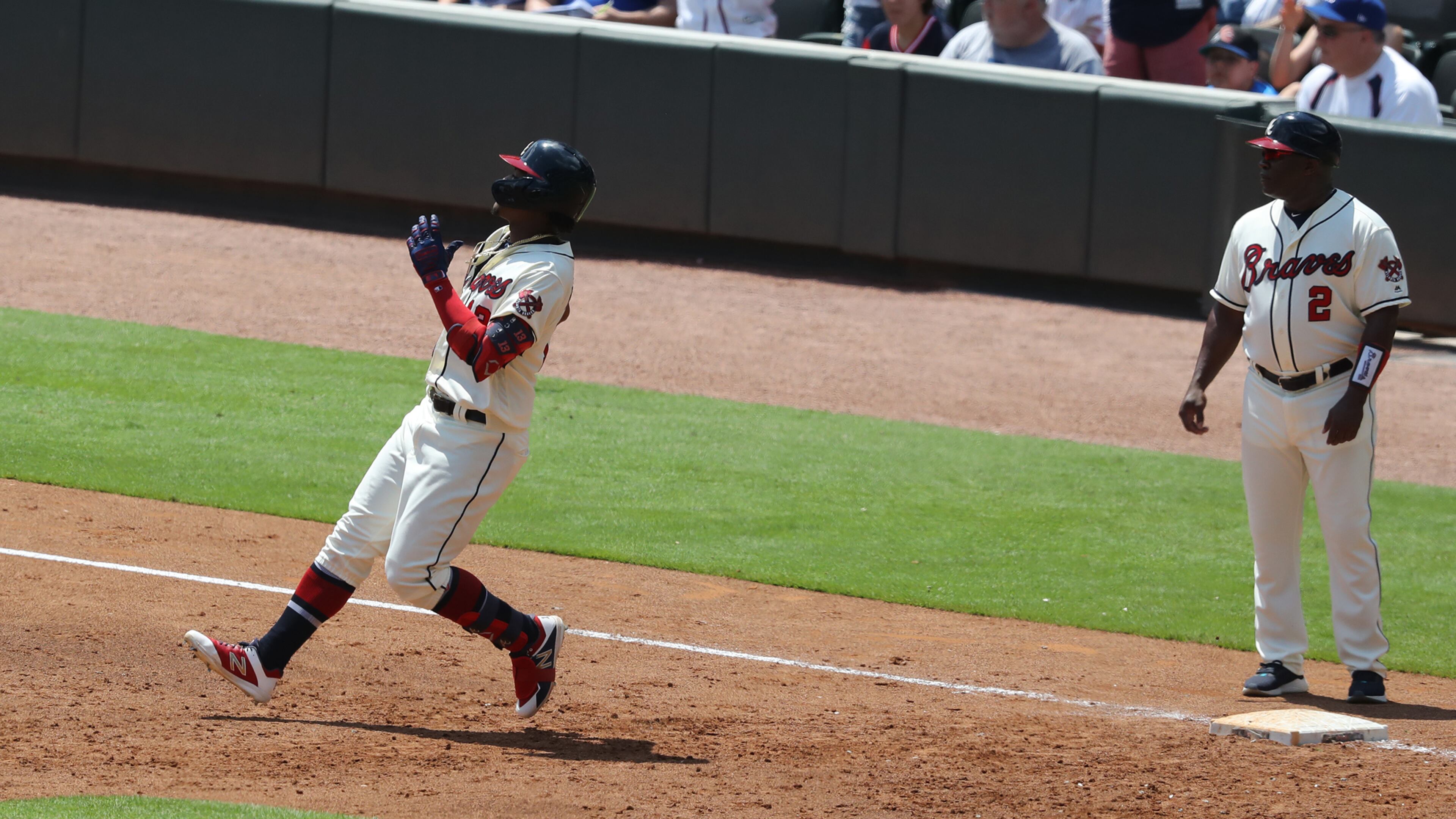The Braves’ newfound depth brings a charge


















In an extended conversation last month, Atlanta Braves general manager Alex Anthopoulos spoke of the two years he spent with the Dodgers as an assistant GM. "Like going to grad school," he said. Then he offered this:
“I really learned to appreciate and value depth. I’m really excited about how deep we’re becoming as an organization. I didn’t appreciate it as much in my time in Toronto. We were more of a star-laden club with not that layer of depth. And being in L.A., I learned to appreciate that, especially that grind of six months, to get in (the playoffs) year-in and year-out, the importance of it.”
On Sunday, Anthopoulos' club came from three runs down to win a game and a series against his former employer. The Braves did this without Nick Markakis, Dansby Swanson, Austin Riley and Ender Inciarte, all on the injured list. They did it without Johan Camargo, demoted after a frightful 4½ months. They did it without the most talented player east of Trout, Ronald Acuna having been benched by manager Brian Snitker after three innings for not hustling, which is never OK no matter how gifted you are.
They did it with nine hits, only two of which came from a member of the Braves' optimal everyday eight. One was a double from pitcher Max Fried. Two were from outfielder Matt Joyce, a 35-year-old on his eighth organization. Two were from shortstop Adeiny Hecharvarria, acquired Friday on waivers from the Mets, for whom he'd just gone 1-for-21. (He's 4-for-9 as a Brave.) Two, including the decisive grand slam, were from outfielder Rafael Ortega, signed to a minor-league deal in January. Ortega is 28. The grand slam doubled his total of major-league home runs.
The Braves wouldn’t be tracking a second consecutive National League East title if they had to run the likes of Joyce, Hecharvarria and Ortega out there every day. They’d be closer to the last-place Marlins, of whom the latter two are alums. But even the best teams need a competent professional to help them through a week, a series, a big-time game against a big-time opponent. That’s why the best GMs — Anthopoulos is among that exalted number — are forever looking for somebody else’s castoff, somebody to fill the holes that will, over 162 games, always present themselves.
The Braves entered the season with two super-utility types in Camargo and Charlie Culberson, and they bought Joyce from the Giants in March to be their fourth outfielder. But Inciarte has been injured twice, and Riley, who supplanted him the first time, hurt his knee lifting weights, and Markakis, who never misses a game, had his wrist broken on an HBP. Swanson, who missed the last part of last season with a bad wrist, developed a sore foot, and Camargo, who hasn’t taken to super-utility duty, was unaccountably awful as a fill-in. That would tax even the deepest of 40-man rosters.
With Acuna, Freddie Freeman, Ozzie Albies and Josh Donaldson, the Braves fit the profile of “a star-laden club.” But Anthopoulos learned with both the Blue Jays and the Dodgers that teams cannot subsist on stars alone. The Dodgers can outspend anybody, but they’re also savvy bargain-shoppers.
They landed Chris Taylor from Seattle in 2016 for a pitcher who was out of baseball by 2018. Taylor has been hurt lately; in 2017 and 2018 he had an aggregate WAR of 8.9, which is almost All-Star stuff. They signed Max Muncy, cut by the A’s after hitting .195 with five home runs over two seasons, in 2017. He hit 35 homers last year; he has 31 now. They got Kike Hernandez, who’d already been traded by Houston, from Miami in the Dee Gordon deal of 2014; Hernandez has started 249 games over the past 2½ seasons at seven different positions. Corey Seager and Cody Bellinger were massive prospects; Taylor, Muncy and Hernandez were just guys.
Joyce, Hecharvarria and Ortega won’t have the lasting impact on this franchise that Taylor, Muncy and Hernandez have had in L.A. (The Dodger threesome was much younger on arrival.) Still, this is how a winning organization sustains itself. It keeps scrounging. A GM can’t just say, “We’ve got a superstar; we’re good to go.” He needs Plans B, C and D. If he can find someone capable of playing multiple positions, all the better.
Adam Duvall looked like a whiff of a trade. Anthopoulos pried him from Cincinnati last summer for Lucas Sims, Matt Wisler and Preston Tucker. The Reds got little from the deal — Wisler and Tucker are gone; Sims is working long relief — but the Braves appeared to bank even less. Duvall hit .132 with no home runs last year. He logged the first 3½ months of this season at Gwinnett. He was summoned when the injury glut hit, and his home runs helped win a vital series in Washington. He hit another off Hyun-Jin Ryu on Saturday. The Braves could have non-tendered Duvall in November; they kept him just in case.
Depth is like insurance: You don’t need it until you do. Injuries forced Anthopoulos to dance even faster — getting a proven shortstop off waivers in August constitutes a coup — but he has done it. The Braves had a winning week against the Mets and Dodgers. They lead the Nationals by 5½ games, with the Mets and the Phillies slipping out of sight. They went 4-2 using guys we didn’t dream would be playing for the Braves come August, but you know what they say about necessity. It’s the mother of lineup cards.
Oh, and the final three innings of Sunday’s victory were worked by the Deadline Triplets — Chris Martin, Shane Greene and Mark Melancon. Nine outs, no hits, no walks. Will wonders never cease?

